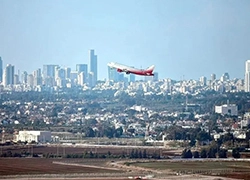The conflict between Israel and Hezbollah has intensified
Tensions between Israel and the Lebanese Hezbollah armed group continue to escalate, leading the Israel Defense Forces to implement GPS signal jamming in northern airspace. After Hamas suddenly attacked Israel on October 7, the situation in the Middle East suddenly became tense and the conflict between the two sides continued to escalate. Researchers at the University of Texas at Austin have long monitored GPS signals in the region and found that aircraft frequently disappear briefly when flying near the Mediterranean Sea. This phenomenon suggests that Israel may be using "GPS spoofing" technology to interfere with the positioning of Hezbollah's missiles and drones.

The dangers of GPS jamming
Todd Humphreys, a professor at the University of Texas, pointed out that this persistent and clear GPS spoofing behavior could affect hundreds of large commercial aircraft. Pilots rely on GPS for navigation, optimizing flight paths and landing safely, so GPS signal jammers and technology pose a major threat to aviation safety. Recently, GPS spoofing incidents over Iran and Iraq even caused a business jet to almost fly into Iranian airspace.

Pros and Cons of GPS Spoofing
Although GPS spoofing can effectively prevent attacks by modern precision-guided missiles, there is also the possibility that missiles will deviate from their intended trajectory and increase the risk of harm to civilians. Iran has provided Hezbollah with a large number of precision-guided missiles and drones that can strike Israel's strategic military targets, and Israel cannot compromise on this. While Israel continues to bomb Gaza, Hezbollah has also threatened to launch attacks, further exacerbating regional tensions.

Importance of Developing an Autonomous Beidou System
The GPS blocking signal jammer interference implemented by Israel in northern airspace not only affects the safety of its commercial flights, but also reminds us of the importance of developing an autonomous Beidou satellite navigation system. In key areas, relying on the navigation systems of other countries may bring unpredictable risks and security risks. Only with an autonomous and controllable navigation system can we guarantee national security and interests in a complex international situation.




